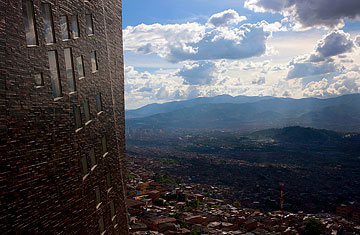
Colombian renaissance A new, ultramodern library in the low-income area of Santo Domingo overlooks Medellín
(3 of 3)
It may also be the best way to break the cycle of violence in Colombia, where the poverty rate still stands at 45% — and where cattle-ranching barons control more than a third of the country's agricultural land, double what experts say they need. (In fact, according to the U.N., just 1.15% of Colombia's population owns 52% of the total land.) "Uribe improved security, but he didn't want to acknowledge the root reasons for the insecurity," says León Valencia, director of the pro-democracy NGO Nuevo Arco Iris (New Rainbow) that consults the Santos government.
As a result, even leftists applaud Santos' Victims and Land Restitution Law, designed to get reparations to people like the victims of Colombia's now disbanded right-wing paramilitary armies. Those militias marauded through the country for decades fighting the FARC — and serving as enforcers for the military and the business owners who financed them, according to new testimony given by some of those moguls to authorities. (The U.S. Congress demanded improved human-rights conditions in Colombia in return for the free-trade pact.)
Those entrenched interests are resisting Santos' reform measures, especially as new land tribunals set up shop in regions like Antioquia this month. Santos backers accuse landowners of employing fresh gangs, bandas criminales, many led by former paramilitary members. One, the Aguilas Negras (Black Eagles), is suspected in the recent murders of Antioquia campesino leaders and has made death threats against reform activists.
If pundits have a criticism of the President, it's that he has a "tendency to overextend himself," says Shifter. Many fret that if he doesn't implement measures like the Victims Law carefully enough, his adversaries will be able to block them, a distinct possibility given the opposition of Uribe and his followers (although several high-profile "Uribistas" have recently been convicted in scandals, often involving links to the militias). "One has to congratulate Santos" for taking on the land issue, says José Miguel Vivanco, Americas director for Human Rights Watch in Washington. "But my fear is that this could turn into another wasted opportunity."
Unfinished War
Yet for all the pro- and antireform tension in places like Medellín, that city is perhaps the exemplar of Colombia's renaissance. Workers this month are putting the final touches on 380-m outdoor escalators in Comuna 13, a steep hillside slum. Like the recently installed cable-car system benefiting other Medellín barrios, the escalators give marginalized residents faster and more secure access to jobs, schools, clinics and commerce, and are complemented by new public libraries teaching computer skills. Officials say violent crime is already down in Comuna 13 since people started using the escalators in December. "I don't wear out so many shoes now," says Olga Cecilia Holguín, 48, a 30-year Comuna 13 resident with four children. "No one ever used to think of things like this for barrios like ours."
That innovative spirit is turning corporate heads. Giants like U.S. computer maker Hewlett-Packard, which last year opened a regional service hub employing 1,000 workers, say they're being lured to Medellín in no small part by improved education and high-tech development — and ironically, says Andrew Lewis, an HP senior strategic-location executive, by the city's new "sense of security."
Still, Colombia needs vast improvements in areas like infrastructure. (It can take longer to ferry a container by land from Bogotá to Cartagena than it does to ship it from Colombia to China.) And its sense of security won't be complete until the nation ends the guerrilla conflict, which began in 1964 and has killed more than 70,000 people since the 1980s. Santos' approval ratings, in fact, have dipped in recent months because of a widespread feeling that security is backsliding as the FARC regroups — it has recently stepped up its attacks on military and civilian targets, especially oil pipelines — and bandas criminales expand.
Despite the FARC's recent hostage gestures, including its February pledge to stop kidnapping for ransom, it has hardly proved an honest negotiator in the past. Santos as a result insists that FARC rebels still have a number of conditions to meet — including de-mining the countryside and halting the recruitment of child soldiers — before the government agrees to peace talks. "I'll be the first to recognize that we are winning, but we have not won yet," Santos, perhaps aware of the warnings about overreach, tells TIME. "But the worst thing I could do is be in a hurry. I have to wait for the correct circumstances to be present."
Waiting may have advantages. Sibylla Brodzinsky, a co-editor of Throwing Stones at the Moon, a forthcoming collection of narratives by Colombians displaced by the war, notes that if Santos can pull off his social reforms, it "takes all legitimate arguments away from the FARC to keep fighting." But 2014, the year Santos presumably seeks re-election, marks the conflict's 50th anniversary — a distressing psychological milestone. Santos is right to be prudent, but chances are he's too shrewd a judge of political symbolism — and timing — to let that hour pass on his watch.
